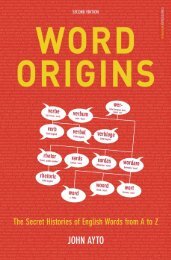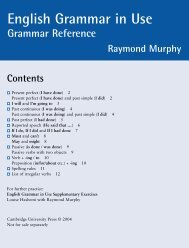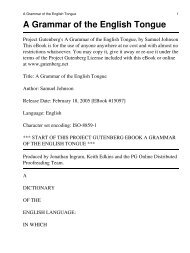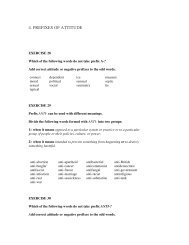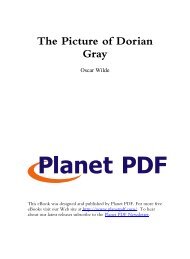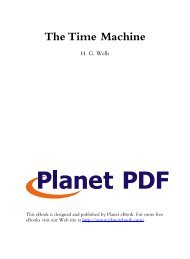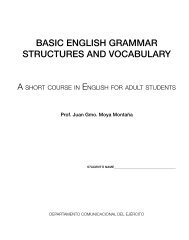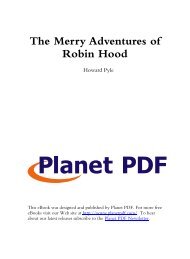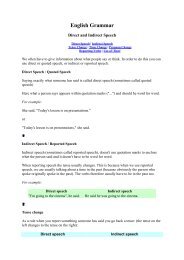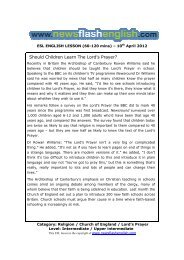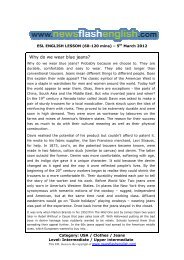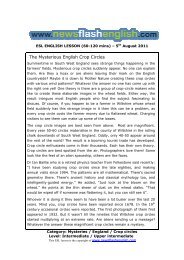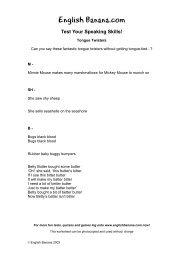TO DOWNLOAD - 75 Pages (928kb - PDF format) - ESL Teachers ...
TO DOWNLOAD - 75 Pages (928kb - PDF format) - ESL Teachers ...
TO DOWNLOAD - 75 Pages (928kb - PDF format) - ESL Teachers ...
You also want an ePaper? Increase the reach of your titles
YUMPU automatically turns print PDFs into web optimized ePapers that Google loves.
June knitted her father a sweater.iubpSCr IranSihvfl indirect directverb objed objectProfessor Lyle showed the students an albino anemone.*ub[ecf Iranjifive icidirecl directverb objed objecrThe store gave each patron a calendar.subject [ransili ir.direci dkodvtrb objftCl abied4, PATTERN IIB:N VTRANSTTTVE VERB NDIRECT NOBJECTIVEelect OBJECT COMPLEMENT.voteappointconsidernameThe people voted Clinton President.Pattern IIB also is a variation of Pattern II. The sentenceis still based on a transitive verb, but the transitive verb isa specialized verb like elect, vote, appoint, consider,label, designate, name, and others. Specialized transitiveverbs like elect permit the writer or speaker to add amodifier of the direct object to the end of the sentence.That modifier of the direct object is called the objectivecomplement, and it can be either a noun or an adjective.SubjectThe studentsThe votersThe policeVerbconsideredelectedthoughtThe governor named5. PATTERN III:N VLINKINGN.Jason is a student.DirectObiectthe courseWaynethe rock s lowMichaelorObjectiveComplementboring, (Adj.)sheriff, (Noun)disruptive. (Adj)appellate judge. (Noun)N VLENKING Adj.Jason is studious.Pattern III sentences are always built around linkingverbs (like is, seems, looks, appears, feels), diat is, verbswhich do not show much action, but which link nounsand adjectives to the subject in such a way that theydescribe or modify the subject. The words linked to thesubject in this manner are called predicate nouns orpredicate adjectives (they are also sometimes calledsubjective complements). Other examples of Pattern III:Subject Predicate AdjectiveThis house is nearly new.Morris looks really tired,Sumo became angry.Avalon is tall.Subject Predicate NounWilma is certainly a beauty.Donald became a sergeant.Dr. Ramsey had been asurgeon.My uncle is a policeman.20E Dependent clausesDependent clauses are statements that have a subject andpredicate but are made subordinate to the independentclause to which they are attached. They always assumethe function of a noun, adjective, or adverb, and accordinglyare called a noun clause, adjective clause, oradverb clause.A noun clause is a subordinate clause used as a noun.Within a sentence, it may be used as the subject, thedirect object, a predicate noun, or an objective complement.Noun clauses are usually headed by one of the followingwords: that, who, whoever, whom, whomever,what, whatever. Because they are nouns, they frequentlybecome part of the basic structure of an independentclause.They knew that the gun was loaded.Whoever rang the doorbell last night hadchocolate on his fingers.What I want for Christmas is a tool box.An adjective clause is a subordinate clause used as anadjective. Within a sentence, it is usually located adjacentto the word it modifies. Adjective clauses are usuallyheaded by one of the following words: who, whom,whose, which, that.The man who is raking the lawn is my uncleBill.Jason Freund is the man whom you saw atmy house.Is Stanford the school that you 'want toattend?An adverb clause is a subordinate clause used as anadverb. Adverb clauses are usually beaded by a subordinatingconjunction such as if, unless, because, before,after, since, as. Because they are adverbs, they are themost movable of modifiers, and can appear in variouspositions throughout the sentence. Remember that alladverbs, including adverb clauses, answer the questionshow, when, where, and why about the verb.Because it was so cold that night, Stanstarted up the main furnace.I will give you a gold pocket watch when yougraduate from high school.The new police chief, if he is wise, will begin aneighborhood patrol program.20F PhrasesNo discussion of basic patterns and dependent clausesshould leave out the third basic element of the sentence,the phrase. Phrases are small bundles of related wordslike in the morning, of my children, brought by the storm,selling popcorn, or to make money. However short andsometimes trivial they seem, they make up more thanhalf the words of written English and provide writers andspeakers with still more ways of subordinating ideas andin<strong>format</strong>ion. Phrases usually function within a sentenceas single words do, such as a noun, adjective, or adverb.On the basis of their form, they are classified as prepositional,participial, gerund, infinitive, and verb phrases.See verbals section,PREPOSITIONAL:She threw trie ball into the dugout. (Adverb)PARTICIPIAL:The town destroyed by the hurricane wasHomestead. (Adjective)32



